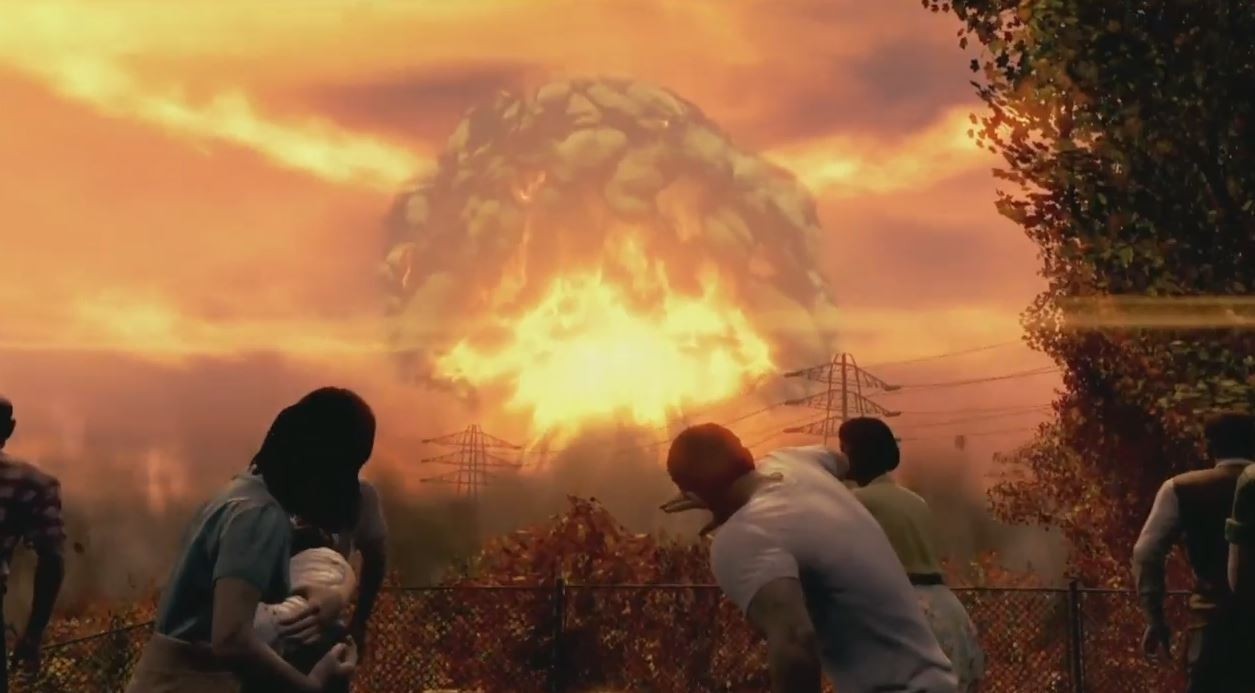Skills
How to Survive a Nuclear Apocalypse
New feature alert! Members of the forum now get the next blog post in advance in the members only forum! Register today, and see Thursday’s post right now!
Discuss this post in The Guild Hall!

If you’re this close and you don’t have a handy-dandy vault to duck into, you’re probably already doomed.
So! The cold war has reignited, with several new and enthusiastic participants! Tensions are high, and everyone is pretty sure someone is going to pull the trigger very, very soon, causing large scale mutually-assured destruction. Yay!
Luckily, this is not the case in our current geopolitical climate. Sure, there’s some threats here and there, but none as large scale as the Soviet Union and the US of A pointing very big guns at each other for twenty years. But, for the sake of the article, let’s assume that two (or more) nations are very close to large scale nuclear war! What should you do to help increase your odds of survival, you itty-bitty future VaulTec experiment, I mean enthusiast, you?
Location, Location, Location!
What holds true in real estate sales holds true in surviving the apocalypse, too! Location is a big deal here, because if a modern nuclear bomb drops within a couple miles of you, there’s basically nothing you can do to survive it. Sorry…
So, what should you look for in a home for you and your loved ones? Well, first of all, you want to get far away from any major cities, any military installations, and any major centers of government. These will be primary targets, and by avoiding them you’ll be decreasing your odds of being hit directly by a bomb. You also want to take a look at how atmospheric winds (check that out on this super cool website) blow in your region, and try to stay away from being downwind from priority targets. Also, pick a locale where your water comes from a well underground, not an above-ground reservoir. The deeper underground, the better!
Finally, try not to be in a ravine, a hollow, or a valley. Definitely steer clear of rivers and streams on your property, especially low-lying ones. These will have higher levels of radiation for YEARS to come.
Gimme Shelter!
We’re going to assume you’ve either picked a pretty good location using the above guidelines, or that there’s nothing you can do about your location so you just want to increase your odds of survival where you are. Well, obviously a nuclear fallout/bomb shelter would be your best bet. Barring that, your basement is your best bet. You want to pick whatever wall in your basement is the most underground. So, if your house is built into a hill, pick the wall that’s into the hillside (a buried corner is even better.)
Now, you want to start building a shelter around that wall. If you have time in advance, build a “box” against the wall out of multiple layers of cinder blocks, filled with hard-packed dirt. Tires filled with hard-packed dirt work, too, but they don’t fit together as well and they’re a lot more difficult to work with.
Barring cinder blocks, on short notice you want to take basically everything you can carry and build the thickest “wall” possible, leaning against that previously selected back wall. Leave a hole for you and your family to crawl into, and then stuff to block that hole up (remember to leave a small space for air flow.) The idea here is to put as much mass around you and your loved ones as possible, to prevent radiation bursts from damaging you. Packed dirt is one of the best insulators available on a large scale, but in an emergency, just throw as much matter as you can at the problem.
As for the rest of the house, if you have time, close all of the doors and windows, duct tape around all the cracks and crevices, and try to keep your dwelling as airtight as possible. The less dust and particulate you allow in (especially in the first two weeks), the better.
Get Geared Up
Okay, some things you’re definitely going to want. First off, gas masks, extra filters, and full-body disposable coveralls with rubber gloves. You’re going to want these for foraging missions outside your shelter after the fallout has cleared enough to be able to move out semi-safely. Remember, the less dust and particulate you get on your skin and in your lungs, the better, especially in the first few months after the bombs.
Next, you’re going to want a generator, preferably something diesel powered as you can’t rely on natural gas lines to stay in service. Obviously you don’t want this directly in your living space, but somewhere relatively sheltered, like a shed, to help minimize damage. You’re going to want this for power (obviously) to preserve food when your non-perishables run out, and most importantly, to power your well pump. Also consider getting a manual pump put in, because your electric one won’t last forever.
Solar panels are good, too, but remember they need a bit more maintenance and they won’t be servicable at ALL for the first few weeks after the blasts, because they’ll most likely be covered in radioactive dust. They also need to be properly maintained (much like a generator), and are less reliable because without a bunch of expensive batteries you won’t have much power after the sun goes down.
A crank powered radio, and both battery and crank powered flashlights are obvious musts. Get lots of batteries for your flashlights (battery powered flashlights tend to be brighter) but prioritize the crank-lights to help preserve your stock. Batteries won’t last forever, and you don’t know if anyone will be making more any time soon. Rechargeable batteries are nice, too.
Finally, a geiger counter or two are definitely a good idea for testing the radioactivity of locations, water sources, etc.
Beyond that, a standard survival kit will serve you well, as well as a bug-out-bag for each of your family members, in case you need to leave your shelter quickly. Be sure to stock up on plenty of medical supplies, and know how to use them. Check out this link for tips on setting up your bug-out-bag.
Food and Water
Obviously, you want to stock up on non-perishable foods in your shelter/basement. Canned goods and dry goods should rule the day. Salt, sugar, and other basic seasonings should be important as well. You’ll want to store seeds to grow your own food post-apocalypse, too. Obviously unless you have a lot of land you’re not going to be growing grains, but vegetables are always excellent.
In regards to water, the reason we selected a property with a deep well is that it should be pretty safe from fallout contamination. Obviously you don’t want to rely on this though so you should also set aside enough water for your family to last at least a few weeks. The general rule of thumb is one gallon of water per person, per day. You’ll also want a bit extra for washing, cooking, and flushing the toilet. Make sure this water is stored in your basement, in a dark place, and properly sanitized containers.
Waaaaaait for it…
Okay, the alarms are going off. You’ve gotten emergency alerts on your phone. You had a bit of advance warning so you taped everything up, and you’ve got your shelter in your basement good to go. Grab your loved ones, your flashlights, a radio, some water, and some food, and head into your basement fort. You’re far enough away that you don’t even hear the blasts, but you’re getting updates on your radio that all major city centers have been hit, all government installations are down, and random blasts have been reported and caught by satellite imagery all over the country.
Now what? Well, you wait. You’ve probably lost power, and you won’t be getting it back for a while (or ever.) Unfortunately, for a while there’s nothing to do but sit. For the first fourteen hours, you’re still at extremely high risk. Hopefully you’ve stored enough food and water to last you for the minimum two weeks. After these two weeks, assuming you’re not in a very high risk area, it becomes safe to start foraging out and about in the world for short periods of time. Send people who are past the age of reproduction first. Radiation damage can be passed onto children, and increase the risk of cancer for the next two generations.
When people go out to forage, it should be as quickly as possible. Make contact with neighbors, if you can, grab immediate supplies if possible (canned goods, gasoline, and diesel should be a priority,) and get back to shelter as soon as you can. Wear your gas masks, cover up as much as possible, and avoid kicking up dust and dirt. Shower when you get back before coming into contact with other family members, and wash your clothes thoroughly. Keep these clothes separate as your designated “foraging clothes,” and get rid of them after using them a few times.
As time goes by, it becomes safer and safer to venture forth from your “vault.” Children and those who are of reproductive age should stay inside for as long as possible without seriously depleting emergency food and water stores to help reduce the chance of developmental challenges or birth defects. At the six month mark after the bombs drop, it should be about as safe as it’s going to get in the open world, for the most part. You’ll have to worry about a myriad of things, but radioactive fallout isn’t one of them, for the most part.
Low-lying areas and open water, however, will remain radioactive for much longer than anywhere else. If you can grow food hydroponically with the water from your (hopefully safe) well, you’ll help decrease the odds of your food containing too much radioactive material.
In the end, life expectancies will probably be much shorter, post-apocalypse, and cancer rates will be much higher. As time goes on, however, humanity can and will recover. We’re like cockroaches, man.
So that’s it! I hope you enjoyed the series on The Vault Dweller! I’m still running my Let’s Play over on Youtube and probably will be for quite a while, considering how little I’ve done in the story so far, so come check it out! I am told I am sometimes hilariously bad! =P
I hope you never have to experience a nuclear apocalypse, but if you do, I hope I’ve helped you survive it (and thrive in it, as best you can.) Live boldly, change the world, and continue to be awesome.
Dan “DaRatmastah” Wallace





“………humanity can and will recover. We’re like cockroaches, man!”
Never put such a motivational & belittling sentence in the same paragraph. I spilled all my coke XD. Great article ,btw. Hope to never use this info in my life.
=D I hope you don’t have to!